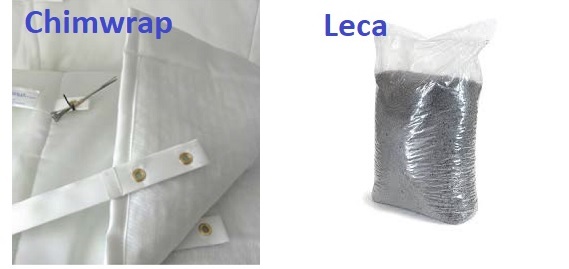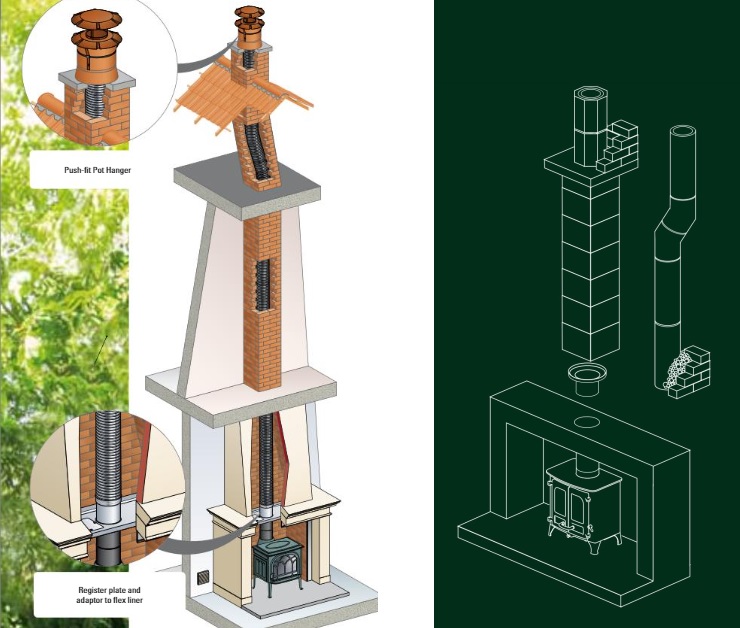We use cookies to make your experience better. To comply with the new e-Privacy directive, we need to ask for your consent to set the cookies. Learn more.
Cold chimney ? Difficulty lighting your wood burner?
Warming your chimney
During the winter months or in extreme freezing conditions you may find it difficult to light your stove or perhaps smoke is building in the stove due to poor draught.
You might need to light a small fire to warm the chimney before lighting a woodburning stove because cold air can create a barrier that prevents smoke from properly rising through the chimney. This is especially true for chimneys that are located outside or in areas with low ambient temperatures.
When the stove is lit, it creates warm air that rises up the chimney. However, if the chimney is cold, this warm air can quickly cool and become denser, causing it to sink back down the chimney. This can cause smoke to spill into the room rather than being properly drawn up and out of the chimney.
By lighting a small fire and allowing it to warm the chimney, you can create an upward draft that will help to draw smoke up and out of the chimney when you light the woodburning stove. This can improve the efficiency of the stove and reduce the amount of smoke that enters the room.
It's important to note that if your chimney is very cold or blocked with debris, it may be necessary to hire a professional chimney sweep to clean it before using your woodburning stove. Additionally, it's important to follow all safety precautions when lighting and using your stove, including using appropriate fuels and ensuring that smoke detectors are in working order.
More advice can be found
https://www.hetas.co.uk/cold-plug-winter-safety-advice-for-stove-users/
Insulating your Chimney
Insulating your flue liner can help improve stove efficiency on a wood burner in several ways:
Retaining heat: When you burn wood in a stove, the flue liner can become very hot, but this heat is often lost as it radiates out into the surrounding brick or masonry of the chimney. Insulating the flue liner can help to retain this heat and prevent it from being lost, which can help to keep the chimney warmer and improve the draft, allowing smoke to flow more easily up and out of the chimney.
Reducing creosote buildup: When smoke cools too quickly in a cold chimney, it can lead to the formation of creosote, a flammable and dangerous substance that can accumulate in the chimney and increase the risk of chimney fires. Insulating the flue liner can help to prevent rapid cooling and reduce the build-up of creosote.
Increasing combustion efficiency: Insulating the flue liner can also help to increase the combustion efficiency of your wood burner. When the chimney is warmer, it creates a stronger draft, which can help to draw more air into the stove and improve combustion, allowing you to burn wood more efficiently and produce more heat with less waste.
It's important to ensure that your chimney and flue liner are properly installed and insulated by a professional to ensure safety and maximum efficiency.
When do I need to insulate my chimney?
Cold climate: If you live in a cold climate where the outside temperature regularly drops below freezing, insulating your chimney flue can help to prevent rapid cooling of the smoke as it travels up the chimney. This can reduce the buildup of creosote and improve the efficiency of your woodburner.
Tall chimney: If your chimney is particularly tall, it may take longer for smoke to travel up and out of the chimney, which can cause it to cool too quickly and create a buildup of creosote. Insulating the chimney flue can help to retain heat and improve the draft, allowing smoke to flow more easily up and out of the chimney.
Large chimney: Similarly, if your chimney is particularly Wide it may be difficult to create a strong enough draft to draw smoke up and out of the chimney. Insulating the flue liner can help to create a more consistent temperature within the chimney, which can improve the draft and prevent smoke from entering your home.
When a chimney needs insulating a hetas installer may use Leca back fill or a Chimney Wrap

In general, if you are experiencing issues with creosote buildup or poor draft in your woodburner, insulating the chimney flue may be necessary. It's important to consult with a professional chimney sweep or stove installer to determine whether insulation is appropriate for your specific situation.
